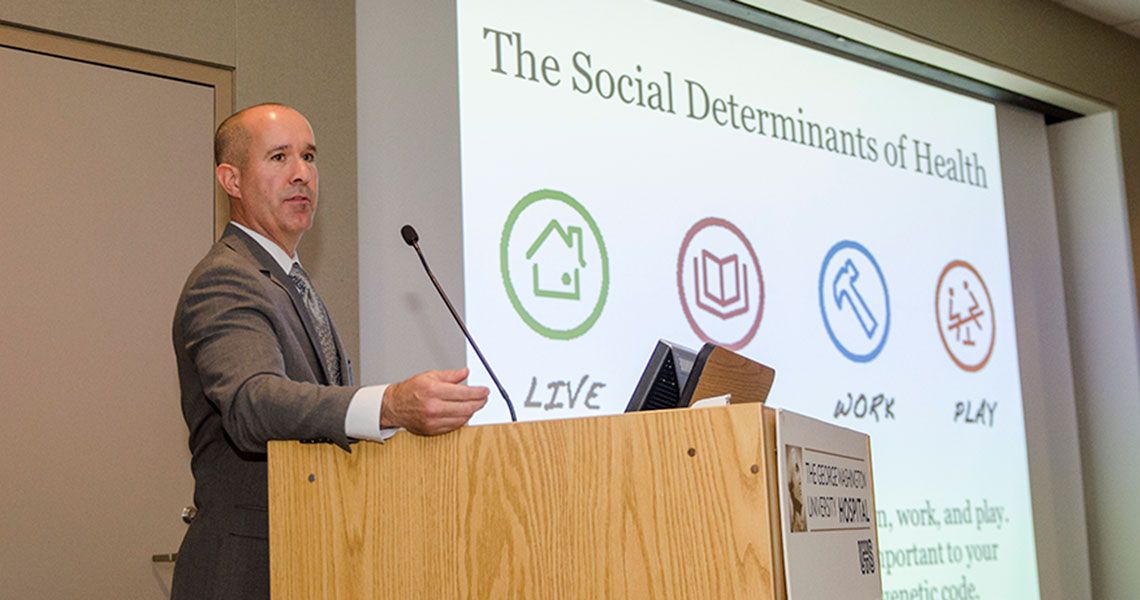Drilling down to the social determinants of health – the factors that impact well-being, including mental health – requires a somewhat unusual approach, according to Michael T. Compton, M.D., M.P.H., chair of the Department of Psychiatry at Lenox Hill Hospital and professor of psychiatry at Hofstra Northwell School of Medicine, in his lecture, “Social Determinants of Mental Health: All Policies Are Mental Health Policies.”
“You should think like a 2 year old,” Compton explained at the 14th Annual Jerry M. Wiener, M.D., Lecture in Psychiatry and Behavioral Sciences. “What do 2 year olds do? They ask a question. What question do they ask? They ask ‘why.’ ”
Following what Compton called the “causal chain,” it’s possible to get to the “causes of the causes” of social determinants of health; in other words, not just what an illness is, but why it happened. Take, for example, Jason, a young boy. Jason, Compton said, is in the hospital. Why is he in the hospital? Because he has a bad infection from a cut on his leg. Why does he have a cut on his leg? Because he was playing in a junkyard next to his apartment and he fell on some jagged metal. Why was he playing in a junkyard? His neighborhood is run down, kids play there, and there’s no one to supervise them. Why does he live in that neighborhood? His parents can’t afford a nicer place to live; his dad is unemployed, and his mom is sick. Why is his dad unemployed? He doesn’t have much education.
“We could actually drill further, but you can see in this example, in part, the risk for Jason developing an infection goes all the way back to things like education, housing, [and] unemployment,” Compton said. “You can see that something driven solely by a pathogen actually has very broad social and environmental underpinnings.”
By exploring these underpinnings, Compton believes it’s possible to effect change. He identified nine core social determinants of health: adverse early life experiences; poor education and educational inequality; job insecurity, underemployment, and unemployment; income inequality and poverty; food insecurity; poor housing quality, housing instability, and homelessness; adverse features of the built environment, or the surroundings and infrastructure, such as buildings, parks, and water supply, that mold human activity; and poor access to health care. All nine, he said, directly impact health.
“In my view, most of these [core social determinants of health] are really linked by being founded upon an unequal and unfair distribution of opportunity,” Compton said. “If we want to understand where that comes from, we again need to dig deeper and ask why.”
At the foundation of the social determinants are two issues, Compton said: social norms (opinions, attitudes, ideology, stigma, beliefs) and public policy (rules, regulations, legislation, laws). “These two things interplay with one another,” he said. “Social norms tend to shape our policies, and our legislation and policy commonly drive how we think about things.”
With that interplay in mind, Compton believes psychiatrists, in particular, should be able to step in and help ease social determinants of health. “We know that there’s no health without mental health,” he said. “The social determinants shed light on how we can pursue prevention.”
Compton divided potential preventive strategies into three categories: clinical interventions, such as screenings, resource guides, and referrals to aid programs; partnerships, like medical-legal partnerships where a civil attorney is part of the clinical team and can help with evictions, for example; and policy interventions.
“We can advocate for policies and laws that improve education, increase employment opportunities, decrease food insecurity, end discrimination, and improve housing standards,” he said, adding that advocacy means not looking just at health, but health in all policies. “We have a voice at the table on some of these things, and we need to figure out how to get at the table. If we’re not at the table, mental health is not going to be part of the discussion.”
Improving the social determinants of health, he added, is a moral and ethical imperative.



